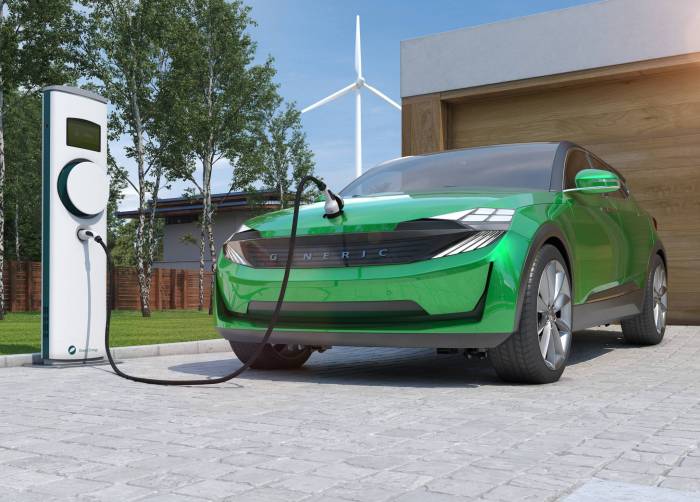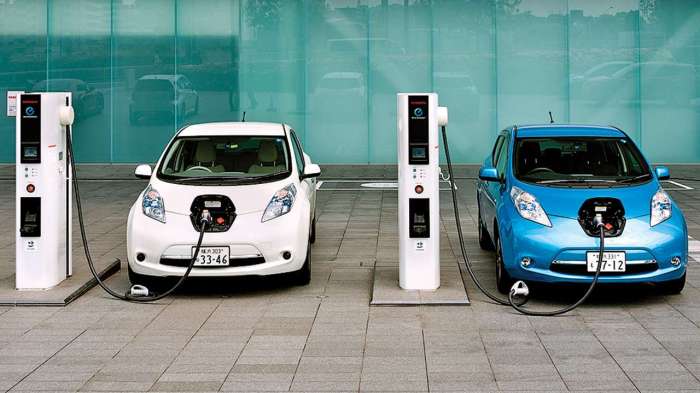Electric vehicles are not just a trend – they’re a game-changer in the automotive world. Get ready to dive into the electrifying world of EVs with a fresh perspective that’s as cool as your favorite playlist.
Overview of Electric Vehicles
Electric vehicles (EVs) are cars powered by electricity stored in batteries, making them an eco-friendly alternative to traditional internal combustion engine vehicles. They have gained significant popularity in the automotive industry due to their environmental benefits and technological advancements.
Types of Electric Vehicles
- Battery Electric Vehicles (BEVs): These vehicles run solely on electricity stored in rechargeable batteries, producing zero tailpipe emissions.
- Plug-in Hybrid Electric Vehicles (PHEVs): PHEVs combine a gasoline engine with an electric motor, allowing them to run on both electricity and gasoline.
Benefits of Electric Vehicles
- Reduced Carbon Emissions: EVs produce lower or zero emissions compared to traditional vehicles, contributing to a cleaner environment and combating climate change.
- Lower Operating Costs: EVs have lower maintenance and fueling costs, saving owners money in the long run.
- Quiet and Efficient: Electric motors are quieter and more efficient than internal combustion engines, providing a smoother driving experience.
Environmental Impact of Electric Vehicles
Electric vehicles play a crucial role in reducing greenhouse gas emissions and air pollution, helping to improve air quality and combat climate change. By transitioning to EVs, we can significantly decrease our dependence on fossil fuels and move towards a more sustainable transportation system.
Technology behind Electric Vehicles
Electric vehicles (EVs) are revolutionizing the automotive industry with their innovative technology and eco-friendly operation. Let’s dive into the key components and advancements that make these vehicles a sustainable choice for the future.
Key Components of an Electric Vehicle
- The Battery: The heart of an electric vehicle, the battery stores electrical energy for the vehicle to operate. Lithium-ion batteries are commonly used due to their high energy density and efficiency.
- The Electric Motor: Electric vehicles are powered by electric motors that drive the wheels. These motors are highly efficient and provide instant torque for a smooth driving experience.
- Power Electronics: Power electronics control the flow of electrical energy between the battery and the electric motor. They optimize energy efficiency and regulate the power output to the motor.
Regenerative Braking in Electric Vehicles
Regenerative braking is a technology that allows electric vehicles to recover energy during braking. When the driver applies the brakes, the electric motor acts as a generator, converting kinetic energy into electrical energy that is stored back in the battery. This process helps improve energy efficiency and extends the driving range of EVs.
Advancements in Battery Technology
- Increased Energy Density: Advances in battery technology have led to higher energy density, allowing for longer driving ranges on a single charge.
- Faster Charging Times: Rapid charging technologies are being developed to reduce charging times significantly, making electric vehicles more convenient for daily use.
- Enhanced Durability: Battery manufacturers are improving the durability and lifespan of batteries to ensure long-term reliability for EV owners.
Challenges and Opportunities in Charging Infrastructure
- Charging Network Expansion: One of the main challenges for electric vehicles is the availability of charging stations. Increasing the charging infrastructure will be crucial to support the growing number of EVs on the road.
- Fast Charging Standards: Standardizing fast charging technologies will make it easier for EV owners to charge their vehicles quickly and efficiently, promoting widespread adoption of electric vehicles.
- Home Charging Solutions: Providing incentives for home charging installations can encourage more people to switch to electric vehicles and reduce reliance on public charging stations.
Electric Vehicle Market Trends

The global market for electric vehicles is experiencing a significant surge in demand as more consumers and governments prioritize sustainability and environmental conservation. This shift towards electric vehicles is reshaping the automotive industry and paving the way for a cleaner and greener transportation future.
Current Global Market Trends
- The sales of electric vehicles have been steadily increasing over the past few years, with a notable rise in market share compared to traditional gas-powered vehicles.
- In 2020, electric vehicle sales accounted for approximately 4% of the global automotive market, with projections indicating a substantial increase in the coming years.
- Major automakers are investing heavily in electric vehicle development, introducing new models with advanced features and longer driving ranges to meet consumer demands.
Government Incentives and Policies
- Government incentives and policies play a crucial role in driving the adoption of electric vehicles, offering rebates, tax credits, and subsidies to encourage consumers to switch to electric cars.
- Countries around the world are implementing stricter emissions regulations and setting targets for reducing greenhouse gas emissions, pushing automakers to focus on producing more electric vehicles.
Growth Projections
- Experts predict a significant growth in electric vehicle sales in the coming years, with estimates suggesting that electric vehicles could account for 30% or more of all vehicle sales by 2030.
- The increasing awareness of climate change and the need for sustainable transportation solutions are expected to drive the rapid expansion of the electric vehicle market globally.
- Technological advancements in battery technology and infrastructure development are also contributing to the growth of electric vehicles, making them more accessible and convenient for consumers.
Future of Electric Vehicles

Electric vehicles are poised to revolutionize the automotive industry in the coming years, with exciting innovations and advancements on the horizon. From cutting-edge technologies like solid-state batteries to the integration of autonomous driving systems, the future of electric vehicles is bright and full of potential. Let’s explore what lies ahead for the world of electric transportation.
Potential Innovations in Electric Vehicle Technology
One of the most anticipated advancements in electric vehicle technology is the development of solid-state batteries. These batteries offer higher energy density, faster charging times, and improved safety compared to traditional lithium-ion batteries. With companies like Toyota and Volkswagen investing heavily in this technology, we can expect to see widespread adoption in the near future.
Impact of Autonomous Driving Technology
The rise of autonomous driving technology is set to have a profound impact on electric vehicles. Self-driving cars can optimize routes, reduce energy consumption, and improve overall efficiency. As this technology continues to evolve, we can expect electric vehicles to become even more integrated into our daily lives, offering a seamless and sustainable transportation solution.
Role of Electric Vehicles in Achieving Sustainable Transportation
Electric vehicles play a crucial role in achieving sustainable transportation in the future. By reducing greenhouse gas emissions, decreasing reliance on fossil fuels, and promoting renewable energy sources, electric vehicles offer a cleaner and greener alternative to traditional gasoline-powered cars. As governments and industries worldwide prioritize sustainability, electric vehicles will play a key role in driving the transition towards a more environmentally friendly transportation system.
Challenges and Opportunities for Mass Adoption of Electric Vehicles
Despite the many benefits of electric vehicles, there are still challenges that need to be addressed for mass adoption to occur. Issues such as limited charging infrastructure, range anxiety, and high upfront costs remain barriers to widespread acceptance. However, with advancements in technology, government incentives, and growing consumer demand, there are ample opportunities to overcome these challenges and accelerate the transition to an electrified transportation future.

